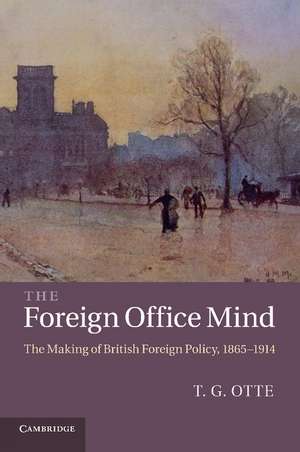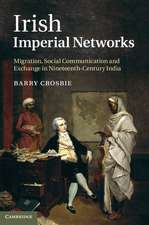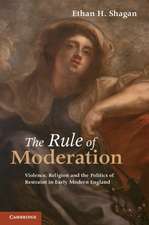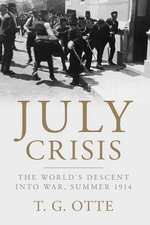The Foreign Office Mind: The Making of British Foreign Policy, 1865–1914
Autor T. G. Otteen Limba Engleză Paperback – 21 aug 2013
Preț: 426.66 lei
Nou
Puncte Express: 640
Preț estimativ în valută:
81.64€ • 85.25$ • 67.42£
81.64€ • 85.25$ • 67.42£
Carte tipărită la comandă
Livrare economică 15-29 aprilie
Preluare comenzi: 021 569.72.76
Specificații
ISBN-13: 9781107613102
ISBN-10: 1107613108
Pagini: 468
Ilustrații: 15 b/w illus.
Dimensiuni: 152 x 229 x 24 mm
Greutate: 0.62 kg
Editura: Cambridge University Press
Colecția Cambridge University Press
Locul publicării:New York, United States
ISBN-10: 1107613108
Pagini: 468
Ilustrații: 15 b/w illus.
Dimensiuni: 152 x 229 x 24 mm
Greutate: 0.62 kg
Editura: Cambridge University Press
Colecția Cambridge University Press
Locul publicării:New York, United States
Cuprins
Introduction; 1. Illusions of supremacy: the Foreign Office mind, 1865–74; 2. The problems of isolation: the Foreign Office mind, 1874–85; 3. Problems of consolidation: the Foreign Office mind, 1885–92; 4. Two eastern questions: the Foreign Office mind and the period of flux in great power politics, 1892–1900; 5. The transformation of great power politics: the Edwardian Foreign Office mind, 1900–7; 6. The end of an era: the late-Edwardian Foreign Office mind, 1907–14; Conclusion.
Recenzii
'Otte opens up our understanding of the role of the diplomatic professionals in the long nineteenth century, keeping a careful balance in his analysis of the role of the professionals and that of their political masters. Meticulous in its scholarship, written with great clarity, this work demonstrates with ease a mastery of a complex and intricate subject.' Erik Goldstein, Boston University
'This is an outstanding book. Otte has used an extraordinary number of sources and found personal papers which most historians did not know existed. He covers an extended period of time, clearly showing how different generations of officials and diplomats reacted to changes in the shifting world scene. This is an authoritative study which will be used by generations of future historians of British foreign policy.' Zara Steiner, University of Cambridge
'This book gives food for thought as well as much historical enlightenment.' The Times Literary Supplement
'By delving into the interaction of policy debates and office politics, this book provides an often fascinating institutional history of the Foreign Office and is a treasure trove of biographical information on many of the ministry's key personnel during this period.' Phillip Dehne, Journal of British Studies
'The Foreign Office Mind is an excellent source for providing a deep examination of the inner workings of the British diplomatic corps interaction with other European powers leading up to the First World War … [Otte] clearly demonstrates that the commencement of the conflict and its horrific cost over the next four years was not inevitable, but rather the result of diplomatic and political manoeuvring by European powers for over half a century for dominance on the European continent and in their colonial spheres.' Eric Haas, H-Net Reviews (h-net.org/reviews)
'A comprehensive analysis.' Total Politics
'This is an outstanding book. Otte has used an extraordinary number of sources and found personal papers which most historians did not know existed. He covers an extended period of time, clearly showing how different generations of officials and diplomats reacted to changes in the shifting world scene. This is an authoritative study which will be used by generations of future historians of British foreign policy.' Zara Steiner, University of Cambridge
'This book gives food for thought as well as much historical enlightenment.' The Times Literary Supplement
'By delving into the interaction of policy debates and office politics, this book provides an often fascinating institutional history of the Foreign Office and is a treasure trove of biographical information on many of the ministry's key personnel during this period.' Phillip Dehne, Journal of British Studies
'The Foreign Office Mind is an excellent source for providing a deep examination of the inner workings of the British diplomatic corps interaction with other European powers leading up to the First World War … [Otte] clearly demonstrates that the commencement of the conflict and its horrific cost over the next four years was not inevitable, but rather the result of diplomatic and political manoeuvring by European powers for over half a century for dominance on the European continent and in their colonial spheres.' Eric Haas, H-Net Reviews (h-net.org/reviews)
'A comprehensive analysis.' Total Politics
Notă biografică
Descriere
Pioneering study which charts how the collective mindset of Britain's diplomatic élite reacted to and shaped nineteenth-century British foreign policy.

















